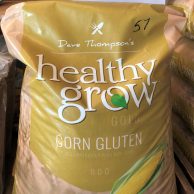 There are plenty of insects that eat plants and these can be damaging. At Harlequin’s we usually recommend supporting plant and soil health, creating diversity and allowing some insect damage before acting. With some pests, it is good to be prepared to act quickly, and sometimes there isn’t a good solution. Even poisons, which we never recommend, can be ineffective.
There are plenty of insects that eat plants and these can be damaging. At Harlequin’s we usually recommend supporting plant and soil health, creating diversity and allowing some insect damage before acting. With some pests, it is good to be prepared to act quickly, and sometimes there isn’t a good solution. Even poisons, which we never recommend, can be ineffective.
Here are some safe methods and products we have found helpful.[Read More]

 With Summer come pest problems. Eggs hatch and spores germinate, and plants are food for all of us folks that don’t photosynthesize. So, what can we do? Share and defend, intelligently.
With Summer come pest problems. Eggs hatch and spores germinate, and plants are food for all of us folks that don’t photosynthesize. So, what can we do? Share and defend, intelligently.